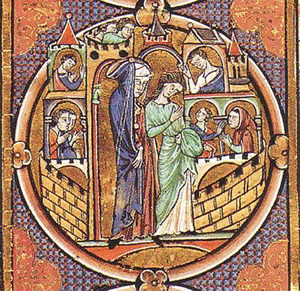
The OT Reading for this coming Sunday comes from the Book of Ruth.
Rabanus Maurus (d. 856) wrote one of the relatively few early commentaries on the Book of Ruth, and the following is taken from its first page:
" 'In the days of one of the Judges, when the Judges ruled, there was a famine on the earth.' What does the famine in the days of one of the Judges signify? It signifies the scarcity of spiritual teachers and masters of the people of God to whom the authority of judging was delegated. This was not a famine of bread or food, but of hearing the word of God in the land born of the Synagogue, when the law was corrupted through the traditions of the Jews (cf. Amos 8, 11), and the Psalms, Prophets, and Divine Histories were confused according to the carnal sense and by a foolish interpretation and not understood according to their own truthfulness. 'A man departed from Bethlehem of Judah to wander in the land of the Moabites with his wife and two children.' Some wish to understand this 'man' as the Ten Commandments of the law, his 'wife' as the Synagogue, and his two 'children' as the two orders of dignity -- the regal and the priestly -- who seemed to rule that territory in the times of the Old Testament. These two orders ruled not only over the Jewish people but also the rest of the nations by dint of their power, and so a certain bond arose between the two peoples of the Israelites and the foreigners in the times of David and Solomon and the other kings. But others understand this 'man' as Christ, who was born of a Virgin in Bethlehem of Judea, wishing to visit the wandering of this world with his 'wife' the Holy Church, whom he presented to himself as 'glorious, without spot or wrinkle' (Ephesians 5, 27), and with his two 'children', whom we can understand as the two orders of the Prophets and Apostles. They are called 'children' [Latin: liberi] because they were freed [liberati] from the yoke of sin and the ancient slavery by the Blood of our Redeemer."
http://sanctiscriptores.blogspot.com
" 'In the days of one of the Judges, when the Judges ruled, there was a famine on the earth.' What does the famine in the days of one of the Judges signify? It signifies the scarcity of spiritual teachers and masters of the people of God to whom the authority of judging was delegated. This was not a famine of bread or food, but of hearing the word of God in the land born of the Synagogue, when the law was corrupted through the traditions of the Jews (cf. Amos 8, 11), and the Psalms, Prophets, and Divine Histories were confused according to the carnal sense and by a foolish interpretation and not understood according to their own truthfulness. 'A man departed from Bethlehem of Judah to wander in the land of the Moabites with his wife and two children.' Some wish to understand this 'man' as the Ten Commandments of the law, his 'wife' as the Synagogue, and his two 'children' as the two orders of dignity -- the regal and the priestly -- who seemed to rule that territory in the times of the Old Testament. These two orders ruled not only over the Jewish people but also the rest of the nations by dint of their power, and so a certain bond arose between the two peoples of the Israelites and the foreigners in the times of David and Solomon and the other kings. But others understand this 'man' as Christ, who was born of a Virgin in Bethlehem of Judea, wishing to visit the wandering of this world with his 'wife' the Holy Church, whom he presented to himself as 'glorious, without spot or wrinkle' (Ephesians 5, 27), and with his two 'children', whom we can understand as the two orders of the Prophets and Apostles. They are called 'children' [Latin: liberi] because they were freed [liberati] from the yoke of sin and the ancient slavery by the Blood of our Redeemer."
http://sanctiscriptores.blogspot.com

No comments:
Post a Comment